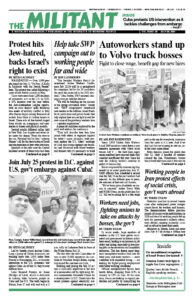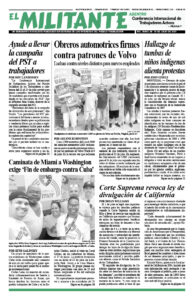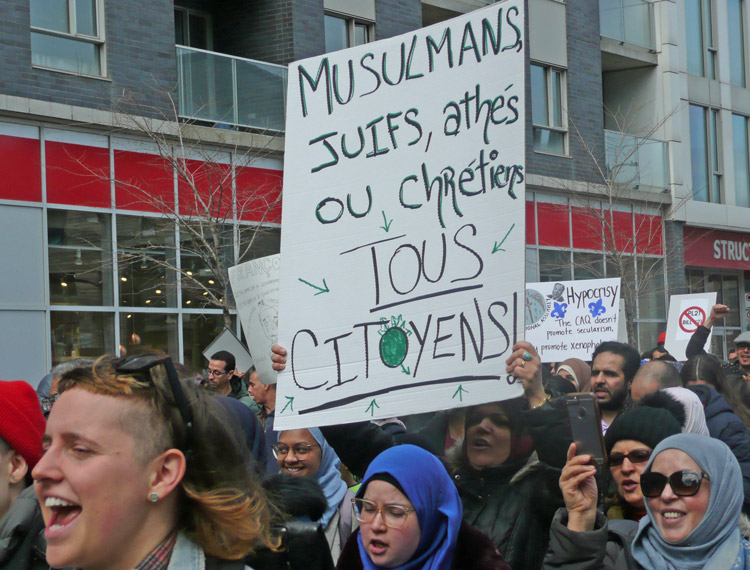MONTREAL — Under the pretext of defending “Quebec’s values,” the government of the Coalition for the Future of Quebec here introduced a bill in the National Assembly May 13 that attacks workers’ rights.
Bill 96 claims to “curb the decline of French in Quebec.” In fact, it limits access to public pre-university education in English for French-speaking youth. It also orders French to be used as the sole language of communication in government matters. English is the first language of close to 15% of the population, and many immigrants speak English as their second language.
The bill follows the passage of the discriminatory Law 21 in 2019. It prohibits public employees of the Quebec government, teachers and others, from wearing religious symbols while performing their jobs, targeting especially female Muslim teachers who wear headscarves and Jewish men who wear a kippa.
An increase in bilingualism
Historically, francophones in Canada were victims of discrimination and oppression based on their language, fostered by the country’s capitalist rulers to divide the working class, deepen exploitation and reap superprofits.
This linchpin of the rulers’ divide-and-rule strategy was dealt major blows by a series of mass struggles, mostly concentrated in Quebec, during the 1960s and ’70s. These struggles, and the support they received from working people across Canada, helped push back inequalities and strengthen the unity of the working class from one end of the country to the other.
While francophones earned 35% less than anglophones in 1961, today their wages are similar. French has become the common language of communication in Quebec.
Supporters of Bill 96 say it is necessary to combat the “decline of French” in Quebec, an assertion that isn’t confirmed by the government’s own data.
In 2016, French was the first language of nearly 80% of the population, but 94.4% were able to converse in French. In 2018, French was the language most often used at work for 90.4%.
In reality, the use of French has not declined, but French-English bilingualism has increased.
From 1961 to 2016, the percentage of people who were bilingual in Quebec went from 26% to 45%. In 2016, 40% of francophones and 69% of anglophones were bilingual.
Across Quebec in 2018, 55.4% of workers regularly used English or a language other than French at work.
The growing bilingualism among workers is the context for the government’s moves to limit access to studies in English in pre-university education. It is an attack on young people who want to improve their English.
In Quebec, only children whose parents or siblings had attended English-language schools in Canada are permitted to attend these schools.
But this restriction does not apply to the CEGEPs (pre-university colleges.) More than 6% of young francophones attend English-language CEGEPs and a little more than 11% of Anglophones attend French-language CEGEPs.
“Ten years ago, I decided to attend English CEGEP,” Philippe Tessier told the Militant. Tessier is the Communist League candidate for mayor in the Montreal borough of Saint-Laurent. “I wanted to improve my knowledge of the language. But it also allowed me to make many anglophone friends from different family backgrounds than mine.
“It’s good for workers to learn as many languages as possible. It helps us communicate with each other,” Tessier said. “This also strengthens the unity we need to wage a fight to establish a workers and farmers government and build a world based on solidarity, not capitalist oppression and exploitation.”
A weapon aimed at working people
In order to protect Law 21 and Bill 96 from inevitable legal challenges, the ruling Coalition for the Future of Quebec is using Section 33 of the Canadian Constitution. This allows federal and provincial governments to suspend the application of rights enshrined in the Canadian Charter of Rights and Freedoms, including freedom of expression, assembly, association and worship.
Since its adoption in 1982, several provincial governments have used Section 33 of the Charter to outlaw strikes and even marriages of same sex couples.
The National Council of Canadian Muslims, the Canadian Civil Liberties Association, and the Autonomous Federation of Teaching (FAE), which represents 50,000 teachers in Quebec, have challenged Law 21 in the courts. The FAE says the law is discriminatory because it infringes on the right of its members who wear an Islamic headscarf.
On April 20, Judge Marc-André Blanchard of the Quebec Superior Court concluded that even if this law violates several “fundamental rights,” the government is “legally unassailable given the current state of the laws.”
Michel Dugre contributed to this article.


